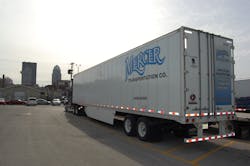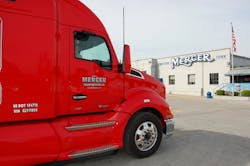Many trucking companies are speeding up technology deployment efforts and regulatory compliance initiatives as they discover shippers are making such moves mandatory prerequisites for keeping current freight business and earning more down the line.
For example, Louisville, KY-based Mercer Transportation recently noted that its 2,500 owner-operators will need to install and use electronic logging devices (ELDs) by July of this year – well ahead of the mandated mid-December 2017 deadline – as well as download the carrier’s smart phone mobile app by July as well in order to provide critical shipment transit data to customers.
“What is important for us is to get more freight,” explained Dale Corum, Mercer’s operations manager during the carrier’s annual drivers meeting ahead of the 2016 Mid America Trucking Show last week.
“We’re in the digital age now; many don’t like it but it’s where we are at,” he said. “Our customers tell us we have very few problems and very few claims, so we’d be getting more business if our [data] reporting was better.”Corum added 1,600 of Mercer’s 2,500 current drivers have already downloaded the carrier’s mobile app, but only 1,200 of them use it consistently. He emphasized that ELDs will need to be used in conjunction with the company’s mobile app in order to document to shippers compliant time and location transit information regarding their cargoes.
He also stressed that Mercer drivers who don’t install ELDs or the app simply won’t be matched to that often-lucrative freight. “We don’t want them knocked out of that opportunity,” Corum emphasized.
John Larkin, managing director and head of transportation capital markets research at Stifel Financial Corp., noted that some shippers have decided that it is too risky to wait until the middle of December 2017 to see if core carriers have sufficiently progressed in installing ELDs as those carriers who have not completed installation would be considered non-compliant.
“Most shippers have little interest in using non-compliant carriers,” he noted in a presentation at the 2016 Truckload Carriers Association (TCA) annual meeting in Las Vegas last month.
“We mention this fairly widespread trend to suggest that the impact associated with ELD implementation may be felt a little earlier than some had projected,” Larkin said.
Data demands from key Mercer customers are also at the heart of this technology-adoption push, noted Joel Franklin, Mercer’s general manager of sales.“Better information determines the [freight] sale and ultimately whether we get the load,” he explained. “A lot of our biggest customers are telling us that if we want to keep their business, as well as get more of it, we’ve got to give them more data.”
Franklin noted those customers represent a quarter of Mercer’s overall freight volume: 57,487 loads in 2015, worth $102.4 million in gross revenue.
“Three years ago, they were telling us they’d like to know where their loads were in transit. Then two years ago they said they really needed to know,” he added. “Last year, that turned into a demand to know.”
Franklin said Mercer’s core shippers want automatic arrival/departure times, plus 15 minute load transit updates. “They’re not asking for the world: they want real-time visibility of their loads and they want to be able to go online and see it,” he pointed out.
Yet Stifel’s Larkin believes companies able to deliver on such demands will be the winners in the freight business going forward.
“Carriers and logistics companies will have to be responsive to the changing demand profile of market,” he explained.
“But those that can be responsive should have ample opportunities to take outsized price increases and gain market share either through organic or acquisition-driven growth.”
About the Author
Sean Kilcarr
Editor in Chief
Sean Kilcarr is a former longtime FleetOwner senior editor who wrote for the publication from 2000 to 2018. He served as editor-in-chief from 2017 to 2018.


